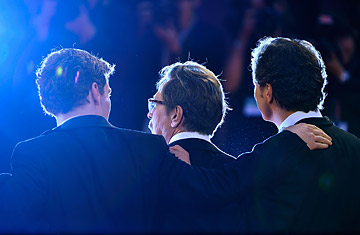
Actors Benedict Cumberbatch, Gary Oldman and Colin Firth attend the Tinker, Tailor, Soldier, Spy premiere at the Palazzo del Cinema during the 68th Venice Film Festival on September 5, 2011 in Venice, Italy.
(3 of 4)
6. Wuthering Heights
Moviemakers have brought Emily Brontë's novel to the screen at least 20
times, most famously in William Wyler's 1939 Hollywood version; in 1954,
that impeccable misanthrope Luis Buñuel transported the tale of doomed love
on the Yorkshire moors to Mexico. Heathcliff, Brontë's stormy Lothario, has
been played by many a romantic star — Laurence Olivier, Timothy Dalton,
Ralph Fiennes and, in a 2009 TV film, Tom Hardy — but never before by two
young black actors: Solomon Glave as the boy Heathcliff, James Howson as the
young man. That casting trick is the main inspiration of Andrea Arnold,
director of two widely admired films in the miserabilist style, Red
Road and Fish Tank (the latter costarring smoldering hunk-du-jour
Michael Fassbender, who at one time in this project's tortuous history was
set for the male lead).
Arnold's other big decision, in this faithful and bold adaptation, was to change the story's two most combustible elements from Heathcliff and his soulmate Cathy Earnshaw to Heathcliff and the brutal climate of rural Northern England. Cathy (played first by Shannon Beer, then by Kaya Scoledario) is still the object of Heathcliff's obsessive ardor; but this wild child is formed and buffeted by the punishing wind, cold and rain as much as by Cathy's brother Hindley (Lee Shaw), whose resentment toward his potential brother-in-law is both sadistic and, under the new circumstances of casting, racist. Employing the shaky-cam to underline Heathcliff's inchoate yearnings, and near-opaque lighting to shroud the proceedings in gloom, Arnold has done for (or to) the classic-novel-to-film genre what Kelly Reichardt's Meek's Cutoff, shown at last year's Venice festival, did to (or for) the pioneer Western: turn formerly heroic figures into prisoners of fate, pawns of remorseless Nature. —M.C.
7. Alps
The wild card in last year's Oscar race for best foreign-language film
was Dogtooth, the Greek parable of a married couple who have raised
their three grown children inside a compound with no exposure to, or
knowledge of, the outside world. This desert-dry comedy suggested immense
promise, or threat, for writer-director Yorgos Lanthimos. Alps marks
no advance, rather a sidestep, in his film career. Every bit as deadpan
loopy as Dogtooth, it imagines that four people have formed a service
in which they impersonate the recently dead as a consolation for surviving
relatives. One of the faux-deceased artistes is a nurse (Aggeliki Papoulia,
the eldest daughter in Dogtooth), who relieves one widower's grieving
by having sex with him; another is a young gymnast (Ariane Labed) who, when
she begs her coach (Johnny Vekris) to be able to do her routine to pop music
instead of to Orff's "Carmina Burana," is told, "You're not ready for pop."
Like a coroner with an impertinent sense of humor, Lanthimos piles up the absurdities like corpses. His new movie doesn't invite an audience into the insanity; it simply demands to be stared at, in awe or incomprehension. —R.C.
8. The Exchange
Eran Kolirin's last film was The Band's Visit, a sweet comedy
about the tensions that arise when Egyptian policemen who have formed a
marching band stumble into the wrong Israeli town. Kolirin's new work,
The Exchange, rejects the ingratiating air of its predecessor for a
mood of prickly disassociation. Oded (Rotem Keinan), a university teacher on
his way to a Ph.D. in physics, and his wife Tami (Sharon Tal), an aspiring
architect, seem to have a satisfactorily loving life. One day Oded cuts
class and comes home one afternoon to find Tami still asleep. He lies about
his absences from work, tosses a stapler out of his office window, visits a
different apartment building and exposes himself before a hallway mirror
— little acts of domestic derangement.
Offering few directorial clues to Oded's motives as he lurches into strangeness, the movie ends with quotations from the final scenes of both La Dolce Vita (beach) and Blowup (returning a misplayed ball during a game). But The Exchange doesn't earn comparison with those great works. It's closer to another Venice competition film, Roman Polanski's Carnage, in that its anarchy and its impact remain on the level of minor misdemeanors. —R.C.
